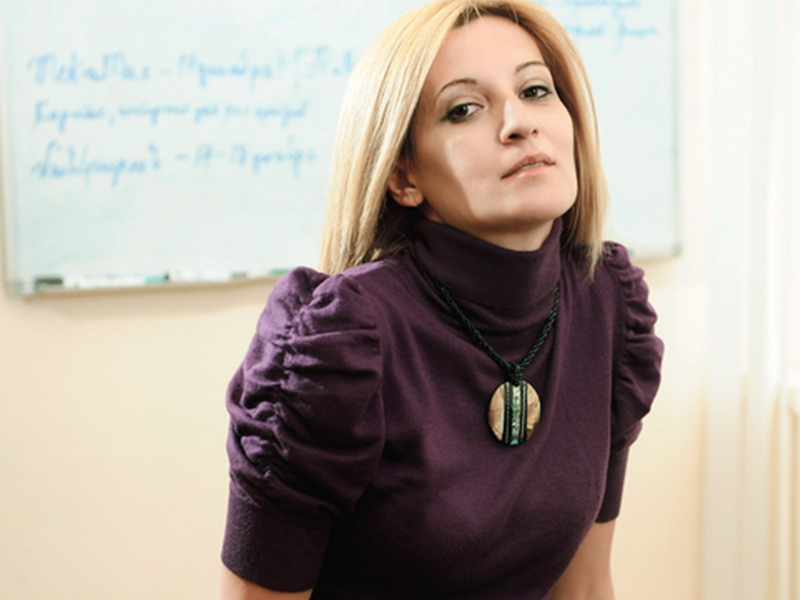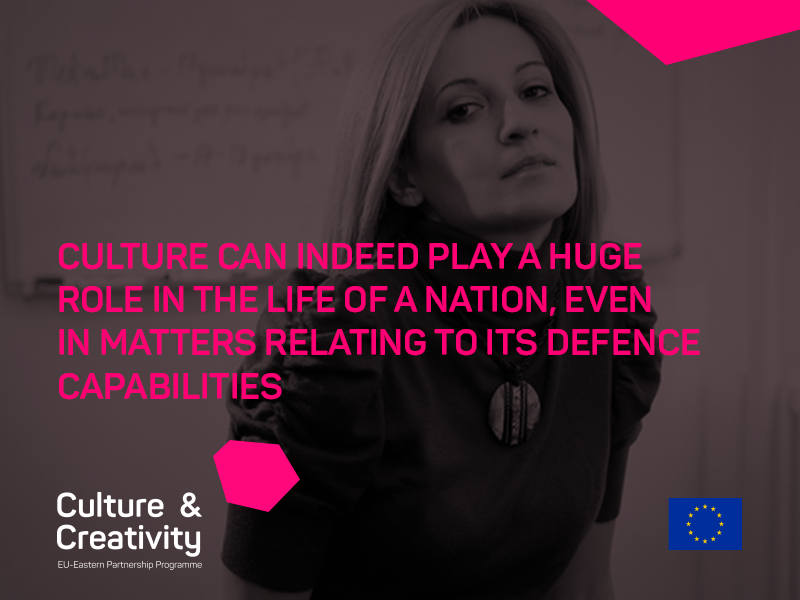
Anush Begloyan: “All propaganda ends where reality begins”
- Anush, you’re here in Ukraine as a communication and advocacy expert. Could you please tell us what advocacy is in the first place, and why do we need it?
Advocacy is a relatively new tool employed to resolve problems by mobilising social support and creating public opinion. This is what contributes to the resolving of problems and influences decision-makers. This is what sets advocacy apart from so-called “service” models in which a solution is perceived only as service of sorts offered by decision-makers to the population. Advocacy is about convincing, persuading, petitioning decision-makers to introduce some change, to initiate some process.
Following the collapse of the Soviet Union, advocacy has presumably been the first and main tool that acted as the catalyst for any social change. It became possible only after former Soviet republics gained independence, since the totalitarian communist model did not suspect that the aspirations of the people can be directly communicated to decision-makers. A paternalistic model always reigns in totalitarian societies according to which the state a priori knows best.
On the other end, important decisions have always been made in democratic societies under grassroots pressure – the opinion of the majority is a basic principle of democracy. In this sense, teaching advocacy is also a process of teaching how democratic societies live. Advocacy is used virtually for all processes that take place in all areas of life of a society. In this sense, any democratic process taking place anywhere in the world may be called advocacy.
It is not an ideology or a methodology. It is a notion of behaviour of sorts, a tool of influence for society over decision-makers. Because those who are at the helm may, of course, know what’s best, but it’s also good when society occasionally reminds them of its priorities.

- Which problems can or can’t advocacy solve?
I can’t name a single problem whose solution can’t be attempted with the use of advocacy. Advocacy can be applied wherever there are socially important problems.
Where isn’t it applicable? These could be problems having to do with secrecy, national defence, state secrets – all those issues that for objective reasons are not subject to public debate. But in those cases, lobbying is applicable.
- How does it differ?
The only difference is that with advocacy the voice of the masses reaches decision-makers directly, whereas with lobbying this happens through a specially trained person (lobbyist), who gets these interests across to decision-makers. There is much public debate surrounding lobbying, including the ethics of it – unfortunately it is not always used for the purposes it was created for.
But in overall terms lobbying stems directly from the concept of democracy. One of democracy’s basic principles dictates that any person has the right to his opinion and may at any moment freely express it to another. Many democratic public institutions were created precisely to make this process possible. The lobbyist is simply a facilitator providing assistance to this process.
When the lobbyist stops defending the interests of large social groups, and representing public interests, at that moment he leaves the realm of advocacy and this activity should have a different name. But as long as the lobbyist expresses the views and aspirations of large social groups and represents public interests, he remains an agent of advocacy.
- Does advocacy in the cultural sphere have any specifics? Could you tell us please about its tools by illustrating examples from the cultural and creative sphere?
With regard to advocacy in culture, it can be examined from several perspectives. The first is the local, regional level at which issues are addressed relating to access to culture of all categories of the population, financial stability of cultural institutions, access of minors to educational institutions, etc.
The second level is the national and international. And here I would, first and foremost, link advocacy to cultural diplomacy. It is the preservation and development of culture within the state and its promotion beyond its borders, as well as everything related to the education of the nation and defining those cultural codes that can protect a nation from aggressive subjugation. Because cross-cultural permeability is very good. Yet aggressive subjugation is precisely what occasionally may be resisted not by walls or arms, but by the consciousness of a nation.
It is culture that determines the ethical code, the moral fibre, characterising any given nation. Morality and ethics, as well as certain behavioural patterns of a nation, determine its life in politics, its economy and social sphere. From this perspective, it can be said that cultural discourse is the foundation for the prosperity and well-being of any nation, no matter how paradoxical this may sound. Because it is precisely what gives people that algorithm by which they feel, see the world and act. In this sense, the influence of culture on the lives of entire peoples and nations is absolutely incredible. And advocacy of the notion that culture should occupy its rightful place in the general socio-cultural complex is of utmost importance, albeit it is underestimated.

- What advice would you give Ukrainian culture professionals in the context of communication? How should they defend their positions and get key messages across?
First of all, I hope that they never think that there’s something they’re incapable of doing. The Ukrainian cultural managers I’ve seen at the seminar in Kyiv were, firstly, cultural mavens, and secondly, well-educated and competent. The only thing that seemed to be lacking was some faith in their abilities.
Ukraine has great cultural potential, and it is still to be tapped. Every time we come to Ukraine, we admire its architecture, artists, urban culture... and are met with the sceptical smiles of our Ukrainian friends. It’s unbelievable!
Try to take a look at yourself from the outside. Look at yourself through the eyes of people who live in other corners of the world and you will realise that you have things to be proud of. You’re an absolutely amazing nation that has something to offer the world.
- Could you please offer a few examples of successful and not-so-successful cases in the field of cultural advocacy from your experience?
I can give the example of a case of how the culture of wearing the Armenian national costume was saved. A flash mob was organised on Facebook (generally Facebook in Armenia is a tool where most advocacy campaigns are carried out) inviting everyone to take photographs of themselves wearing national dress. And people went to photo studios, took photos and shared them.
Of course, this campaign was partly an information war, which we are waging against our neighbouring state [Russia – author’s note]. The goal of this campaign was to demonstrate the authenticity and historical value of the Armenian national dress. As a result of the flash mob, people began to not only post online recent photos of themselves dressed in national garb, but also those of their grandmothers and great-grandmothers wearing just such national dress. This was the best proof of the success of this campaign – at the international level the question about the importance of the Armenian national costume was settled once and for all.
Today, the national dress is experiencing a new wave of popularity in Armenia; it is very fashionable – people wear it even to take corporate photos, and corporations are actively encouraging this. Many studios have popped up where you can take your photo dressed in national dress. Designers have begun to use the national motif. It has built up to a snowball effect, where some local objective has suddenly acquired some completely new possibilities that begin to push forward business, organisational culture.
In this sense, culture is a very powerful resource for resolving conflicts and gaining allies. By better learning about the culture of neighbouring countries, other countries begin to support one another in various aspects.
In the context of possibilities of cultural diplomacy, I can also give the example of Lithuania, which thanks to the Heart of the Baltics project was able to establish successful relations with Germany, with whom historically it had a very complex relationship. Nevertheless, according to recent polls, the absolute majority of Germans view Lithuania as their closest European ally. And the opinion of the Germans has great influence not only at the level of political statements but also at the level of diplomatic relations, international investments and much more. It was cultural diplomacy that set in motion this snowball.

- There’s a war going on in Ukraine. And it is not just an armed conflict but also an informational confrontation. The public often argues about whether Ukraine should adopt Russia’s methods and even manipulate information, if this plays to our advantage. In your opinion, is this permissible in an emergency situation?
This is a difficult question... You know, as a communication specialist, I can say with confidence that propaganda has never had a long-term effect. Propaganda ends where reality begins. That is why wasting time, resources and efforts on propaganda is absolutely ineffective. This applies not just to Ukraine, but also to all countries that are trying to act in response to Russia with its weapon of choice in the information field.
Propaganda provokes severe intoxication, but it ends very soon, and as a rule, it is followed by severe withdrawal symptoms. That resource of aggression that is produced in connection with propaganda and forms in people hatred and aggression turns sooner or later against those who launched this propaganda.
Unfortunately, history tells us that there is not a single historical example of propaganda changing the life of a nation for the better. I am very sceptical about the consequences of the information policy pursued by Russia at the moment. At the same time, good communication based on rational perceptions has a significantly more lasting influence on people’s minds. But to change social attitudes with PR tools, without propaganda techniques, would require a year or two. Only in this way can a certain set of values be formed in an audience, thereby allowing people subsequently to do the right thing.
I believe that for Ukraine what is important now is to be able to make the present élan of national and civil self-awareness more deliberate, to move it from the short-term to long-term memory. For that your resources are perfectly sufficient. You just need to learn to expend them not on opposing absolutely absurd information, but trying to create from the inside in Ukraine that information culture which would allow people to remain reasonable.
It is important now for Ukraine to build its own informational defence, by explaining to people what is really happening. For example, debunking the propaganda nonsense that now exists in the information space. Of course, you cannot merely debunk, you also have to offer people an alternative view of the world. But you have to offer it by addressing theirnous, because only the nous allows people to remain reasonable in any circumstances, even the most extreme.
There is a concept in information warfare called “asymmetric attacks” or “asymmetric responses”. It is the most effective response – just as in aikido where the most effective tactic is to direct the force of the attacker against him. For that you don’t need to use the same force as his...
- …but sometimes the forces are simply unequal. Thus, Russia invests huge resources (financial, lobbying, information) into forming favourable public opinion internationally. What can Ukraine do in this situation with the more modest resources at its disposal? What tools of information defence should we use?
Of course, Russia’s resources far exceed yours. On the other hand, they spend huge resources on that, which will die tomorrow. You have to defend yourself in this situation. You need a strategy of information defence. You have to debunk false propaganda and not allow it to permeate your society. In this sense, I look favourably upon the steps that Ukraine is now taking regarding the defence of its information space by restricting the presence of Russian information products. Hygiene is always a good thing. And informational hygiene in particular – the less propaganda permeates your information space, the better.
On the other hand, you don’t have to join the game and become like the other party, using the same methods, going to the same level. In the event of any confrontation – you are correct, your forces are unequal today – they will simply take you down. But if you work on your goals, you’ll make it through. Believe me, there’s nothing worse for an aggressor than when his aggression is unable to break you.
I would advise Ukraine to work out some information strategy aimed at construction and creativity. And to assess the risks not in relation to what was said the day before on Russian news (in my opinion, even those in Russia no longer believe their news) but in relation to how their actions impact the implementation of your strategy.
- With the start of military operations, a relevant Ministry of Information Policy was established in Ukraine, but there has been no clear national state strategy so far...
You see, an information strategy should not be a military one. It has to be creative. You have to understand first what you want and only then make adjustments to the military situation. The war that is currently taking place is undoubtedly an external risk for you. You will have to carry out your strategy in circumstances of external aggression. It’s a shame, but there’s nothing that can be done about it. You will have to foresee the necessary defence mechanisms. But don’t forget that Ukraine’s information goal is not to win but to make it through and build a strong and independent Ukraine.
Source: http://culturepartnership.platfor.ma/anush-begloyan/




